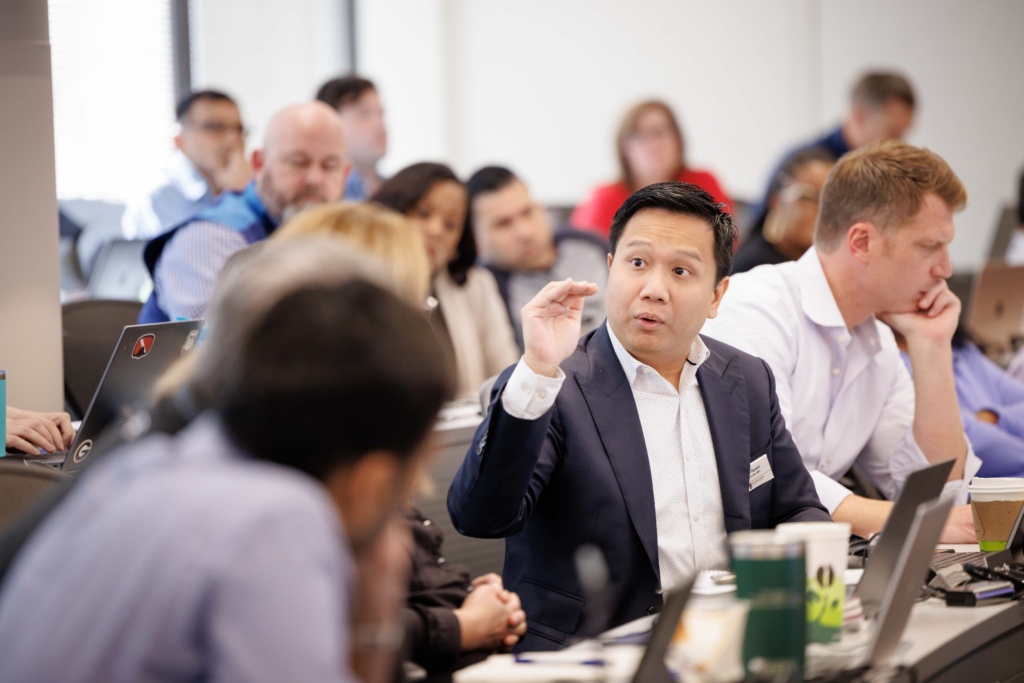
EMBA students attend class at the Terry Executive Education Center in Atlanta, GA. Courtesy photo
Living in Alpharetta, Georgia, Lynsey Atkinson, 39, had no shortage of choice when looking for an executive MBA program.
In Atlanta alone, a 39 minute drive from her home city, there’s Emory University’s highly flexible Goizueta EMBA (ranked No. 8 by Poets&Quants’ latest composite ranking) with in-person, online, and hybrid options. There’s also Georgia Tech’s Scheller EMBA (ranked No. 28) and the EMBA at Georgia State’s Robinson College of Business.
But Atkinson applied to just one Atlanta-based program: University of Georgia’s Terry College of Business. Its executive MBA boasts an impressive average work experience of 18 years, higher than all its competitors and most major EMBA programs. That level of expertise rivals even the prestigious Sloan Fellows programs at Stanford GSB, MIT Sloan, and London Business School where candidates typically have 10 to 20 years of experience.
“The credentials and expertise of not only the instructors, but my fellow students, is impressive. The teachers bring in a lot of practical experience, which is valuable and provides credibility. Also, how the program is structured made it doable with my professional workload and home life,” says Atkinson, EMBA ‘23 candidate at Terry.
“When you have instruction from top-tier professors, but then can compare and learn from others who have real-life experiences… that experience is priceless.”
TERRY COLLEGE OF BUSINESS EMBA SPOTLIGHT
UGA Terry’s program lasts 18 months, and includes 51 credits that includes an elective to focus learning. Students can also choose to pursue extra certificates.
Coursework is delivered through seven, 9-week core business modules, and each module has three weekend classroom sessions running Fridays and Saturdays. So, students come to the Terry Executive Education Center in Atlanta about once per month, says Susan Brown, Director of Executive, Professional & Online MBA Programs at Terry College of Business. In between in-person meetups, students complete about half of the coursework through distance learning in an online format.
“It’s not really ‘online learning,’ it’s really distance learning. There is no synchronous or asynchronous component. You might, for example, have some assigned readings or some videos to watch, but there is no ‘online learning component,’” Brown says.
The program has three required residencies. Its opening residency on Terry’s main campus in Athens, Georgia, focuses on organizational behavior and leadership. Its closing residency, also in Athens, is the executive capstone simulation which ties together everything the students learned over the last 18 months. It also has an international residency of seven to nine days. This year, students went to Japan.
As it follows the cohort model, students go through the program together. Cohorts typically run about 50 students, but the school enrolled 59 – a school record – for its latest incoming class.
SMALL COHORTS, TEAM-BASED LEARNING
Atkinson has 15 years work history in the transportation industry, and she’s now working as Southeast regional vice president of Veritiv which recruited her in 2017. The wife and mother of a 7- and 3-year-old, she had long considered going back to school, but she kept delaying the decision because of life and work commitments. After her company collaborated with UGA Terry for an executive leadership program a couple of years ago, she knew she was ready.
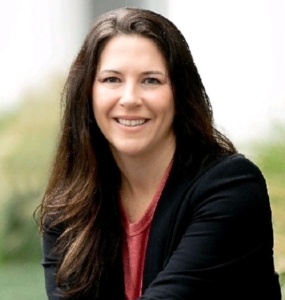
Lynsey Atkinson
“My previous exposure with Terry left such a great impression that I knew that’s where I wanted to go,” Atkinson tells Poets&Quants.
She also knew that she wanted a program that offered as much of an in-person experience as her schedule would allow.
“It’s obviously beneficial to jump on a Zoom call with classmates to work on a project, but I wanted to learn in the classroom,” she says. “Outside of the curriculum, the networks and friendships I’ve built within my cohort are hands-down the most valuable part of the experience so far.”
As far as return on investment, Terry reports that 35% of its typical cohort receives a promotion while enrolled in the program, 36% changed employers either during or soon after completion, and 40% are awarded new responsibilities at work. That bodes well for Atkinson who ultimately hopes her Terry EMBA will propel her into a c-suite position, regardless of where she lands.
In the meantime, she loves taking the new strategies and lessons out of the classroom and applying them to her current work.
Q&A WITH SUSAN BROWN, EMBA DIRECTOR
UGA Terry’s Executive MBA ranked 19th in Poets&Quants’ 2022 composite EMBA ranking, up 25 spots from its No. 44 ranking the year before. Our composite ranking is based on U.S. schools’ performance in the three major EMBA rankings – U.S. News & World Report, the Financial Times, and The Economist – and schools that don’t participate in all three are penalized by our methodology.
This week, Poets&Quants For Execs is looking into the program as part of our EMBA Spotlight series. Our conversation with Susan Brown, presented below, has been edited for length and clarity.
What is the typical cohort size and what are you at currently?
The average size is 50. The current first years enrolled in the fall was 59, and that's a record year for us.
Any idea on why that might be?
The year before was one of what we call the COVID years; It was a record low for us. A lot of people thinking of an executive MBA kind of put it on pause during COVID. They didn't know what work was going to look like, and they didn't know what going back to the office was going to look like. So what we think happened was everybody put it on pause, and now they're coming back. Right now, we're tracking for another 58 or 59 students for the next class. So people know what work looks like, they know what their life looks like, and they're coming back.
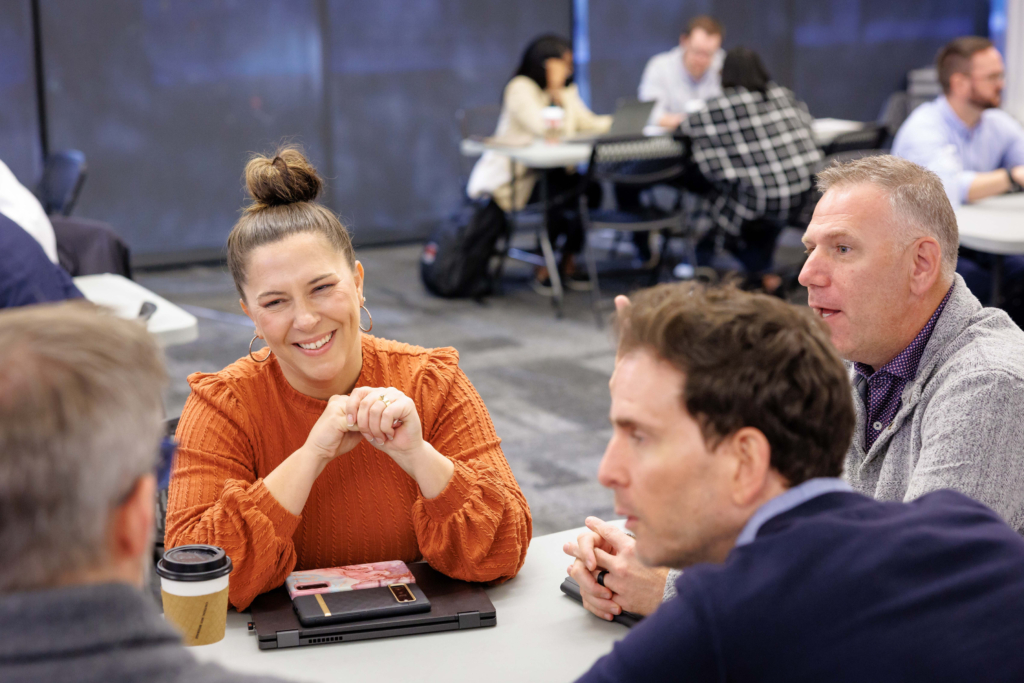
UGA Terry EMBA students at the Atlanta Tech Village. Courtesy photo
What does the average class profile look like? What kind of students do you target?
Our average years of work experience is 18 years. So, we're actually ahead of most programs, especially our competitors. We average 12 years in leadership, so again, ahead there.
The last class that came in, we're actually a little bit ahead of where we've been there too in terms of make up: 36% female, 33% racially diverse, 31% military.
Give us a brief history of the UGA Georgia Terry Executive MBA.
The first class graduated in 2002 or 2003. It was Terry College’s first move to have a presence outside of Athens, so we initially leased the space out of the Atlanta Financial Center, but moved a few years later to where we are in Live Oak Square. We're at about 38,000 square feet here in the heart of Atlanta’s Buckhead District.
We’re in our 22nd year of operation, and we have about 1,100 graduates. I'm only the second director the program has ever had. My predecessor built the program from nothing. So we're in a great place.
You’ve held quite steady in terms of enrollments for many years. Do you have any plans to grow or expand in that area?
We're very happy and comfortable with where we are right now. Terry just announced a few months ago our online MBA, which is a new cohort of our Professional MBA.
We're not right now planning to do that with our executive program. Won’t rule it out for the future, but what we find is our executive MBAs want to be in person. We lead the Southeast in years of work experience, and they want to be in the classroom with that experience.
So, right right now we're happy with that. We've added a lot to the curriculum, and we think that's another reason why enrollment is going up because of what we've added and because of who's in the classroom.
Tell us about the additions to the curriculum.
First of all, we've added to the international trip a business strategy challenge. On that trip, we do something with a company in that local market. For example, in Iceland, we worked on a strategy challenge around pay equity for a company.
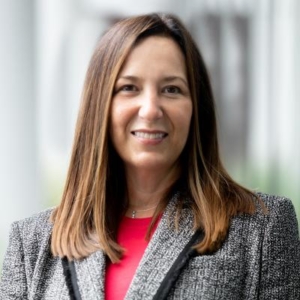
Susan Brown, UGA Terry
We have added the Lean Six Sigma Greenbelt series and certification for all of our students, if they want it. We've added a Leading Change series and certification, Leading Organizational Transformation and Change. We've added a certificate in workforce diversity, a certificate in entrepreneurship, and added a mergers and acquisition workshop.
We took our HR for Business Leaders and made that a required course, just looking at how the world is changing and how it's different than it was before COVID.
We haven't made the program any longer. We haven't made it cost any more, but we've added things that make it more valuable to our students. We used a little bit of dead space between when they finish and when they graduate, and we just tweaked a few things to make it, we think, more valuable to them.
What is the mission for the Terry EMBA?
The mission of the Terry College of Business is “the pursuit and dissemination of knowledge to educate and inspire future leaders and promote the effective and ethical practice of business.” We do that within our program.
We have students who hold very senior managerial positions. They're already recognized as leaders within their industry and organizations. So, we want to grow their leadership development through making them better … generalists is not the right word, but we're not looking to make, necessarily, accountants or super finance people or things like that. We're looking to make them better strategic thinkers. Better soft skills, better decision makers, better leaders across all of those areas – better servant leaders, better teachers to the next generation of leaders. That's what we're out to do.
What would you say is the value proposition for your program, particularly being in Atlanta where there's quite a bit of choice for students?
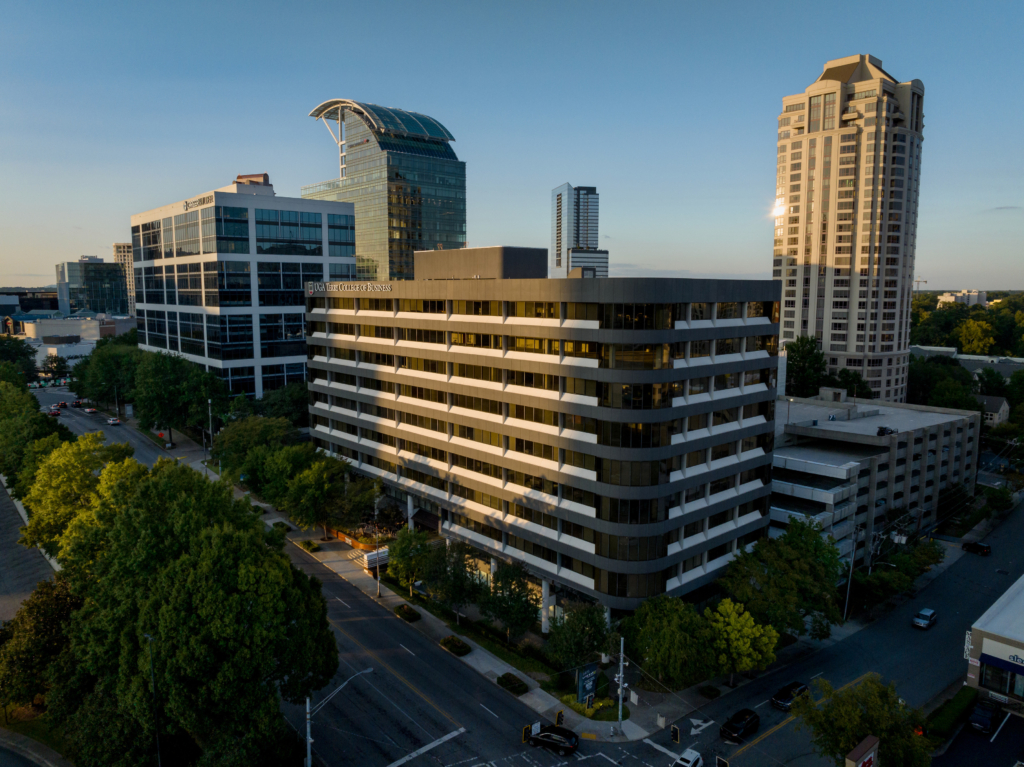
The Terry College of Business Executive Education in Atlanta. Courtesy photo
A difference in us, I think, from the other programs in Atlanta is really the differences of who's sitting in the room. We have a 50/50 split between on-campus in person, and distance learning. So we meet about once a month. It's a true work life balance.
We also have a higher average level work experience with our incoming students compared to our competitors, so we truly only select and work with students who are at the senior levels of their organizations. We have 18 years of work experience. Emory has 14, Georgia Tech has 15. That's a huge difference.
I think the other thing is we're very conscious about who we accept. We don't want to accept 75 or 80 students, we're very happy at the number we're at. We're choosy about our demographics. I don't mean just what people will look like and how they fit a diversity profile. That's important, but industry is also important. We want to be well rounded there. We want to have a variety of functional areas there too.
We also want to make sure that our students fit in and that they are happy with their decision to join us. We don't lose students; We have a 99% graduation rate. We want them to come sit in a class and have lunch with our current students. We want them to come to networking events with our students and with our alumni. We offer to connect them to students or alumni in their field. We really take time to get to know them. Our director of admissions interviews every single EMBA applicant.
Every applicant that we offer admission to, I offer to meet with them. I'm an alumni of our program, I was a faculty member, and now I'm the director, so that's a unique opportunity. And we have so many students who come back and tell us that nobody else treated them that way. I think that matters to folks.
Any program innovations you’d like to highlight?
I’ve already highlighted the big ones, but we're constantly rethinking things. Right now we're thinking through business analytics and if there is anything different we need to do. We don't necessarily want to add courses because they will make the program longer, but we do swap anything out?
I come from industry where you're always tweaking things, so that's my mindset.
What opportunities and/or challenges are you looking at for the EMBA degree generally and the Terry program specifically?

EMBA students in class at the Terry Executive Education Center. Courtesy photo
Changing employer sponsorship with fewer and fewer employees paying for their employers is a big one. Large corporate partners, we're seeing a lot more of those in Atlanta bringing it back fairly easily, but smaller employers are still struggling with it. We also got a huge surge in our military students, most of whom do come with money, but you want to enroll a balanced class.
There's the constant value of the MBA question. That's something I think everybody's struggling with. We all believe it is extremely valuable, and it's probably more valuable post COVID than it ever has been. But it's always redefining what that means and selling that. Online competition is growing. Coursera, and edX, those things are out there and are competition. So, how do you evolve and grow against those?
Anything else you’d like to add?
We're just constantly rethinking programs and offerings within classes, trying to look at ways to incorporate new technologies, diversity, inclusion, current events, and business situations. We’re currently looking at global events, emerging markets, where to travel and that kind of thing.
DON’T MISS THESE STORIES IN OUR EMBA SPOTLIGHT SERIES:
- THE UNIVERSITY OF TEXAS AT AUSTIN MCCOMBS EXECUTIVE MBA
- UW FOSTER’S PROGRAM BRINGS STUDENTS TO SEATTLE’S TECH MECCA
- EMORY GOIZUETA’S PURSUIT OF FLEXIBILITY
- TCU NEELEY’S PROMISE: ‘ROI STARTS MONDAY’
- AT UMN CARLSON, A NEW CURRICULUM & HYBRID OPTION
- HOW CORNELL JOHNSON’S PROGRAM IS UNIQUELY SUITED TO THE MOMENT
- THE BENEFITS OF RUTGERS' ACADEMIC-RUN EMBA POWERHOUSE
- THE TWO-TRACK PROGRAM IN THE HEART OF MUSIC CITY





Questions about this article? Email us or leave a comment below.